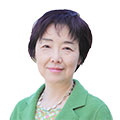A reflection on the past, for the future
Wars of any kind seemed far in the past when I was living in Japan. At that time, the most recent military incident Japan had been involved in was World War II, which had ended nearly 70 years earlier.
The history curriculum at both my junior and senior high schools began with study of the primitive age running up to the present day, but often the teachers ran out of time to complete the course. The final lessons before the end of the school year therefore closed on the events of the 1930s.
My contemporaries and I thus grew up without really thinking about what had happened after this period. The only time we thought about war was in connection with particular days of 1945: 6 and 9 August, when atomic bombs were dropped on Hiroshima and Nagasaki, respectively, and 15 August when Emperor Showa announced that World War II had ended.
I learned—or re-learned—of Japan’s involvement in the war in detail after coming to the UK. Frequently aired television and radio documentaries on the wars that have taken place have fascinated me. There have been abundant opportunities to learn about the past, and to use that knowledge to look at the present from many perspectives.
This year marks the centenary of the start of World War I. To date there have been numerous programmes, events, exhibitions and books published to commemorate the occasion in the UK and France, as well as many other European countries.
It is not surprising considering Europe was one of the main battlefields, and an unprecedented number of people there lost their lives.
In August this year, with a revived interest in WW I due to the commemorative coverage, I visited a war memorial in northern France.
The Thiepval Memorial to the Missing of the Somme was built for more than 72,000 British and South African soldiers, with no known grave, who died in the battles of the Somme between 1916 and 1918. The building is very grand, with the names of the soldiers beautifully engraved on the walls.
I also went to Troisvierges in northern Luxembourg, where hostilities on the western front are believed to have begun. It was at this town’s railway station that German soldiers disembarked on 1 August 1914, violating Luxembourg’s neutrality.
This invasion occurred shortly before the German army trespassed into Belgium, which created a situation where the UK had to fulfil its promise to defend the country according to the 1839 Treaty of London.
One of the many events that triggered the start of WW I took place in Sarajevo, the capital of Bosnia and Herzegovina. On 28 June 1914, Austrian Archduke Franz Ferdinand and his wife were shot dead by Gavrilo Princip, a sympathiser of the revolutionary group Young Bosnia.
On the day of the centenary, I stood on the exact spot where Princip had fired his revolver. Floral tributes to commemorate Ferdinand’s death lay nearby.
Citizens of Bosnia and Herzegovina live with the scars of ethnic wars that took place during the 1990s in the aftermath of the collapse of the former Yugoslavia. About 200,000 people in the Balkan countries lost their lives. Today, the unemployment rate is high and tension among the different ethnicities remains.
I went to Sarajevo City Hall, where a special concert for the centenary was held. The hall was converted into the National and University Library of Bosnia and Herzegovina in 1949, before being closed down in 1992 after being attacked by Serb shelling.
Reopened as the city hall in May this year, the building houses a plaque stating that on 25 and 26 August 1992, over two million books, periodicals and documents were destroyed in a fire set by “Serbian criminals”, together with the request: “Do not forget, remember and warn!”
In a country where Bosniaks, Serbs and Croats are the main ethnic groups, such a sign won’t help reduce existing tensions.
Sadly, war is not a thing of the past. Military conflicts do continue in various forms. While treading in the footsteps of WW I, I try to learn lessons on avoiding such conflict, from the perspective of a person who thankfully has never lived in a nation experiencing war.


